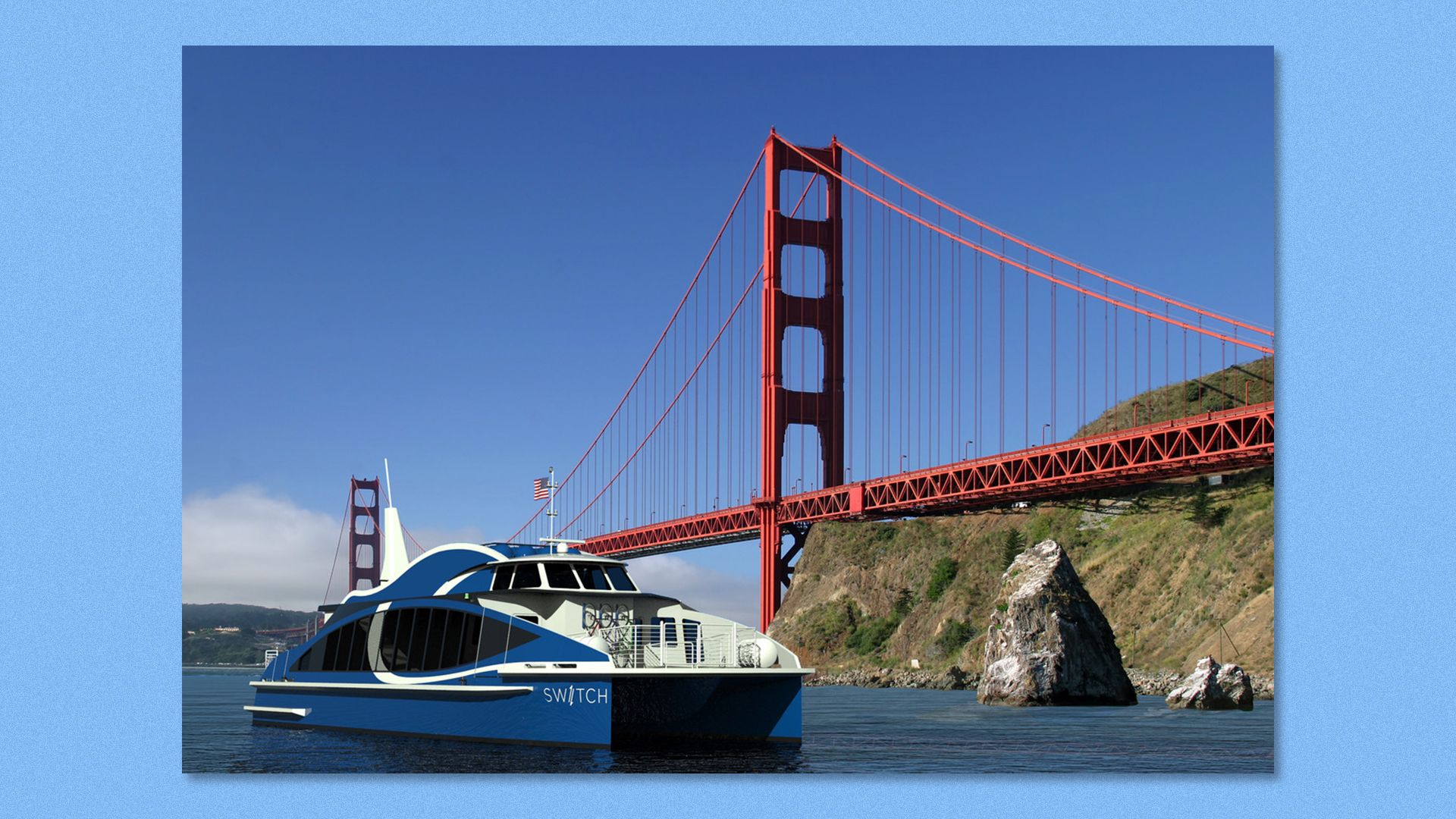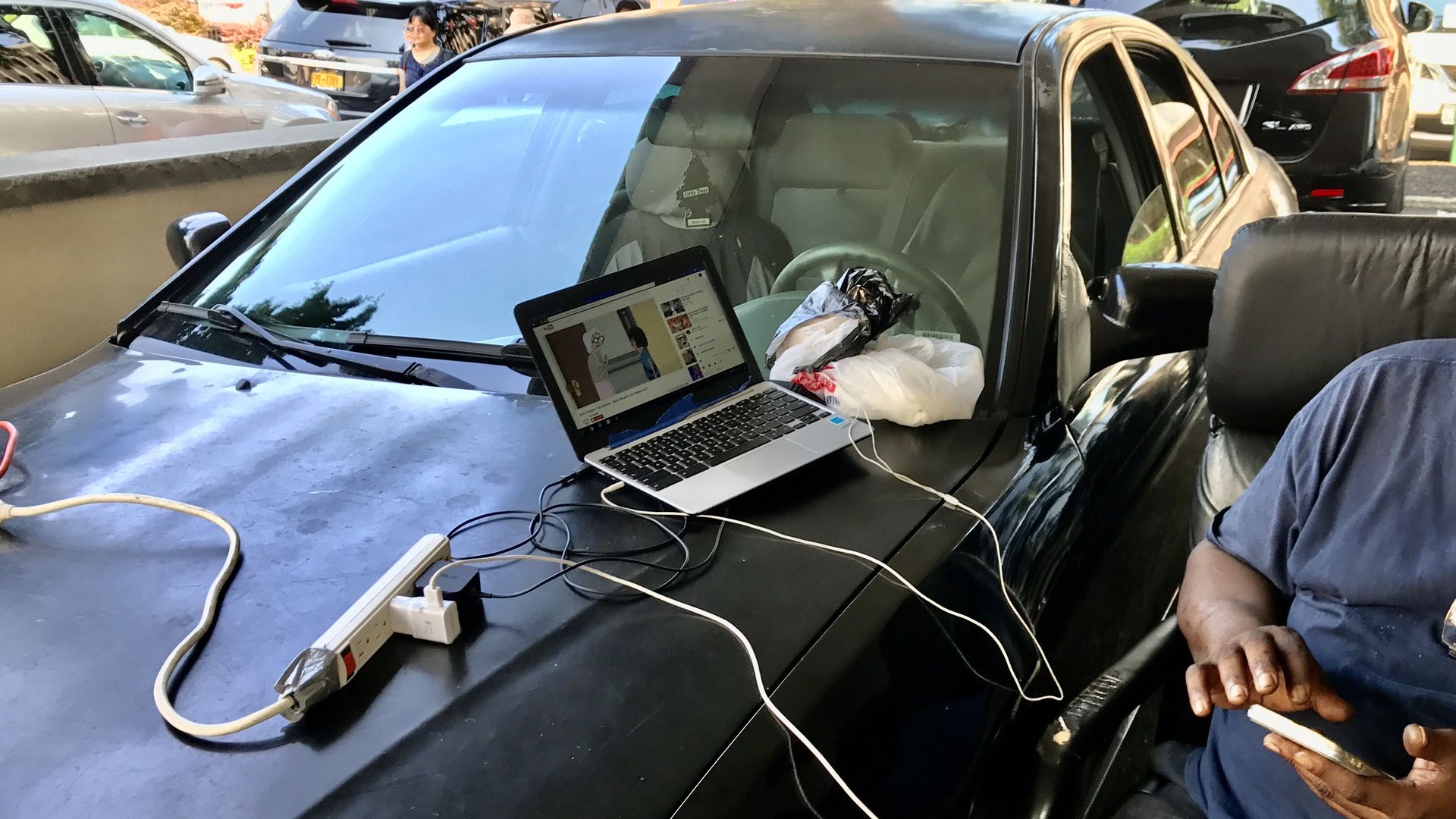| | | | | | | Presented By General Motors | | | | Axios What's Next | | By Joann Muller, Erica Pandey and Jennifer A. Kingson ·Aug 24, 2021 | | Planning a cross-country flight this fall? You might encounter better food at 30,000 feet, and here's why. - We're also letting you in on a new option for outdoor lovers: how to book someone's private property for camping.
Is technology changing the way you spend time outdoors? Send us an email — and photos! — about your adventures for our daily reader photo contest! whatsnext@axios.com. Join Axios today at 12:30pm ET for a Hard Truths event on systemic racism and higher education. Guests include Howard University president Wayne A.I. Frederick, Common App CEO Jenny Rickard, and Harvard professor Anthony Jack. Register here. Today's Smart Brevity count: 1,110 words, 4 minutes. | | | | | | 1 big thing: Farm to tray table |  | | | Illustration: Rae Cook/Axios | | | | Your menu options, if you happen to find yourself in the first-class cabin of a Delta flight from Seattle to Boston this fall: - Skagit River Farms Polish kielbasa with Beecher's cauliflower mash or pan-roasted chicken with fingerling potatoes, Skagit River Farms bacon and Walla Walla caramelized onions in a kimchi butter sauce.
What's happening: Airlines are trying to win back premium customers with better in-flight meals featuring fresh, local fare, a J.D. Power travel analyst tells Joann Muller. - Carriers are adding gourmet-sounding seasonal foods and craft beers to entice their customers to be happier — and to pay more.
Flashback: It started with gourmet vendors in airports. - "What we've seen is that people are more willing to pay a higher price for local food ... like crabcakes in Baltimore, or a moon pie in Kentucky," said Michael Taylor, leader of J.D. Power's travel practice.
- At my home airport in Detroit, that means Plum Market with Zingerman's famous sandwiches (the crusty bread is amazing), or Grobbel's Gourmet Deli, known for its mouth-watering corned beef.
- Airlines followed suit, experimenting with premium-cabin meals featuring distinctive flavors inspired by chefs at some of the country's most popular restaurants — a far cry from "the feather or the leather."
- But then COVID-19 hit. Many airlines stopped serving meals altogether or switched to sealed plastic containers.
Now, they're trying to lure us back with coast-to-coast or trans-ocean menu offerings like: - Alaska Airlines: Guajillo chile-lime salad with ancient grains, roasted broccoli and sweet potato with a roasted lemon crema, and miso-marinated cod with sesame garlic farro, sauteed yu choy, bell peppers and shiitake mushrooms in a sesame-miso butter sauce.
- JetBlue: Build-your-own meal (even in coach!) like roasted chicken thigh over a base of brown rice with herbs, or spiced eggplant over coconut cauliflower quinoa, with sides of mac and cheese and a mixed heirloom tomato salad sourced from Dig Acres in upstate New York.
- United Airlines: Egg scramble with plant-based chorizo, or grilled chicken breast with orzo and lemon basil pesto — with a chocolate "Pie in the Sky" dessert specially created by Chicago-based Eli's Cheesecake.
Then wash it down with a local craft beer or curated regional wine. The catch: Sourcing local ingredients for airlines that hop all over the country — or the world — can be tricky. - Some airlines aim to reduce the logistical challenge by requiring customers to pre-order their selections.
What to watch: COVID isn't going anywhere — and, with cases rising, the Federal Aviation Administration recently extended its mask requirement to Jan. 18. - In-flight meals might be tastier, but eating them will remain a challenge.
Share this story |     | | | | | | 2. The future of camping |  | | | Illustration: Brendan Lynch/Axios | | | | An app set to launch next month may change the way people experience the outdoors, Axios Northwest Arkansas reporter Worth Sparkman writes. What's happening: Stuart Collier, an Arkansas real estate broker, is launching Explore Eden, which helps people book campsites on private property. - It'll offer everything from RV-ready spots to primitive locations and even so-called "glamping" sites, where, for an extra fee, posh tents will be erected ahead of arrival.
- Airbnb already offers glamping, but Collier aims to compete through better service, like vetting sites and helping private landowners with photography and video.
Why it matters: The pandemic has renewed interest in outdoor recreation. Explore Eden is capitalizing on that — while tapping into the estimated $87 billion global vacation rental business. - Public campgrounds often lack privacy, defeating the objective of finding peace and solitude outdoors.
What to watch: The app is set to launch mid-September with sites in Arkansas, but Tennessee, Texas and North Carolina could be next. Read the full story |     | | | | | | 3. Amazon: From big boxes to big-box |  | | | Illustration: Aïda Amer/Axios | | | | Amazon is expanding its retail footprint with the very store format it killed — the department store. Driving the news: Amazon is cooking up plans to open large stores that sell clothes, household goods, electronics and more, the Wall Street Journal scoops. The big picture: The pandemic wiped out hundreds of thousands of stores and accelerated the rise of e-commerce, turning retail into a survival of the biggest. - The future of retail has plenty of room for brick-and-mortar stores, but that space will increasingly be dominated by the big players that thrived during the pandemic, like Amazon and Walmart.
Why it matters: Amazon's domination of online shopping will make it an even more formidable competitor in the physical retail space because it has piles of cash to invest in its storefronts and troves of data on what consumers like and how they shop. Details: Some of Amazon's first department stores will pop up in California and Ohio, and they'll occupy about 10,000 square feet, per the Journal. The typical department store is around 30,000 square feet. But, but, but: Don't count out the old guys just yet. After disappointing sales numbers in 2020, Kohl's and Macy's have bounced back. |     | | | | | | A message from General Motors | | Driving the future of America | | |  | | | | From designing the revolutionary new Ultium Platform to the first electric vehicles it will power, General Motors is investing billions not just in EVs and AVs, but in American manufacturing itself. Learn more. | | | | | | 4. Sea change: a hydrogen-powered ferry |  | | | Rendering of Sea Change, a ferry powered by hydrogen fuel cells. Image: SWITCH Maritime | | | | The country's first vessel powered by hydrogen fuel cells is undergoing trials and could begin passenger service later this year in San Francisco Bay, Joann writes. Why it matters: The 70-foot, 75-passenger ferry represents an important step in the U.S. maritime industry's effort to transition away from fossil fuels to cleaner methods of propulsion. Driving the news: The vessel, dubbed Sea Change, was launched last week by All American Marine, a shipyard based in Bellingham, Washington, and SWITCH Maritime, an investment company focused on zero-emissions maritime vessels. How it works: The Sea Change runs on electricity generated by a 360-kilowatt fuel cell system. - Compressed hydrogen gas stored in 10 onboard tanks flows to the fuel cells, where it mixes with air, creating electricity that powers a pair of 402-horsepower electric motors. The only byproduct is water.
- When the boat is idling or traveling at low speeds, excess electricity is stored in a 100-kilowatt battery until needed.
- The estimated range is 300 nautical miles.
What to watch: SWITCH still needs U.S. Coast Guard approval to transport the vessel to California, where it will be leased to an existing ferry operator to begin commercial operation. Share this story |     | | | | | | 5. Reader photos |  | | | Photo: Clifford A. Sobel | | | | What's Next: The portable workplace Clifford A. Sobel writes: "I captured this image in Great Neck on Long Island [New York]. This photo reminded me of how digitally connected and dependent we have become. This gentleman works at a parking lot, ensuring cars are secure. I wondered what else he might be doing to occupy his online day." Photo: Stefani Koorey What's Next: Ads for freebies move from driveways to social media Stefani Koorey of Westport, Massachusetts, writes: "This wood was once a cluster of five red maples, felled for a driveway extension. "An ad was placed for free firewood on Facebook marketplace. (Reimagining the "free" sign on roadside items.) "Lickety-split, within half an hour, it was gone!" |     | | | | | | A message from General Motors | | Driving the future of America | | |  | | | | From designing the revolutionary new Ultium Platform to the first electric vehicles it will power, General Motors is investing billions not just in EVs and AVs, but in American manufacturing itself. Learn more. | | | | Thanks for reading! If this email was forwarded to you, subscribe here. |  | | It'll help you deliver employee communications more effectively. | | | | | | Axios thanks our partners for supporting our newsletters. If you're interested in advertising, learn more here.
Sponsorship has no influence on editorial content. Axios, 3100 Clarendon Blvd, Suite 1300, Arlington VA 22201 | | | You received this email because you signed up for newsletters from Axios.
Change your preferences or unsubscribe here. | | | Was this email forwarded to you?
Sign up now to get Axios in your inbox. | | | | Follow Axios on social media:    | | | | | |











No comments:
Post a Comment